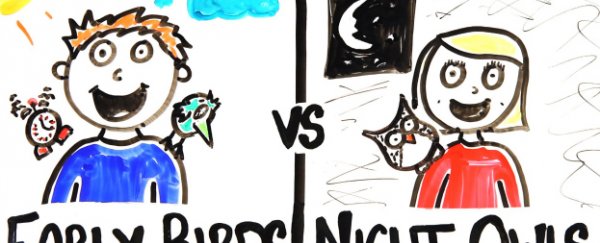
According to popular belief, the early bird catches the worm - and generally people who wake up early are also thought to be more organised and productive than people who sleep in.
But is that really the case? AsapSCIENCE looks into whether night owls or early birds are really more successful - and they prove that even if you're a night person, you're definitely not lagging behind in life.
The truth is, we actually have very little control over whether we're a night or a morning person. Research has shown that the preference is almost entirely genetically determined, and that being a night owl or early bird is passed down through a family member.
It makes sense from a genetic point of view, because back when we were living as hunter-gatherer tribes, it was extremely risky having everyone sleep at the same time - instead, having naturally differing body clocks meant that someone was always awake to keep watch.
But in modern society, we're pretty much trapped in a 9-5 routine, which means that poor night owls are at a natural disadvantage, and constantly face sleep deprivation.
Researchers have even come up with the term "social jet lag" to describe the sleep deprivation that many late-night lovers experience to accommodate social norms.
This means that, yes, night owls are at a disadvantage in a way. Chronic sleep deprivation has some pretty real effects on the brain, and studies show that night owl university students have lower overall grades and are less optimistic and proactive than morning people.
Night people also have less white matter in the brain - which helps neurons communicate - and this means there are fewer pathways for feel-good hormones such as serotonin or dopamine to travel through.
But it's not all bad news - late nighters also tend to be more creative and have higher cognitive abilities than morning people. And what they lack in white matter they make up for in levels of cortisol, a stress hormone, which is linked to more opportunities available and financial gain.
There's also evidence that night owls have more mental endurance than their early-rising counterparts.
Perhaps most fascinatingly, research has shown that there's one specific genetic region, near a gene called Period 1, that results in a one-hour difference in your waking time when altered. And, believe it or not, scientists have also found a correlation between those genes and your time of death - early risers are more likely to die around 11am, while night owls are more likely to die before 6pm.
And when it comes to teenagers, it turns out that hormones can temporarily overcome our genetic differences…but we don't want to give too much away.
Watch the episode of AsapSCIENCE above to find out more about why you wake up and fall asleep when you do, and how this impacts your life.
